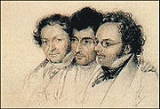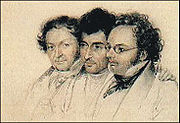
Anselm Hüttenbrenner
Encyclopedia

Austria
Austria , officially the Republic of Austria , is a landlocked country of roughly 8.4 million people in Central Europe. It is bordered by the Czech Republic and Germany to the north, Slovakia and Hungary to the east, Slovenia and Italy to the south, and Switzerland and Liechtenstein to the...
n composer
Composer
A composer is a person who creates music, either by musical notation or oral tradition, for interpretation and performance, or through direct manipulation of sonic material through electronic media...
. He was on friendly terms with both Ludwig van Beethoven
Ludwig van Beethoven
Ludwig van Beethoven was a German composer and pianist. A crucial figure in the transition between the Classical and Romantic eras in Western art music, he remains one of the most famous and influential composers of all time.Born in Bonn, then the capital of the Electorate of Cologne and part of...
he was one of only two people present at his deathand Franz Schubert
Franz Schubert
Franz Peter Schubert was an Austrian composer.Although he died at an early age, Schubert was tremendously prolific. He wrote some 600 Lieder, nine symphonies , liturgical music, operas, some incidental music, and a large body of chamber and solo piano music...
, his recollections of whom constitute an interesting but probably unreliable document in Schubertian biographical studies.
Hüttenbrenner was born in Graz
Graz
The more recent population figures do not give the whole picture as only people with principal residence status are counted and people with secondary residence status are not. Most of the people with secondary residence status in Graz are students...
, the son of a wealthy landowner. He attended the Graz Lyzeum, and studied law at the University of Graz
University of Graz
The University of Graz , a university located in Graz, Austria, is the second-largest and second-oldest university in Austria....
, but was also composed music at this time. Count Moritz von Fries (1777-1826) was impressed with his ability as a pianist, and following the Count's advice, Hüttenbrenner left in April 1815 for Vienna to study under Antonio Salieri
Antonio Salieri
Antonio Salieri was a Venetian classical composer, conductor and teacher born in Legnago, south of Verona, in the Republic of Venice, but who spent his adult life and career as a faithful subject of the Habsburg monarchy....
. His first published works (for piano; and songs) began to appear shortly afterwards, and the String Quartet (Op. 3) came out in 1816. He briefly returned to Graz in 1818, but was back in Vienna the following year, earning a living in a government office. In 1821 Hüttenbrenner inherited the family estate and married.
Schubert sent the manuscript of his Unfinished Symphony
Symphony No. 8 (Schubert)
Franz Schubert's Symphony No. 8 in B minor , commonly known as the "Unfinished Symphony" , D.759, was started in 1822 but left with only two movements known to be complete, even though Schubert would live for another six years. A scherzo, nearly completed in piano score but with only two pages...
to Hüttenbrenner, via Hüttenbrenner's brother Josef, around 1823. The manuscript remained with Hüttenbrenner until Johann Herbeck
Johann von Herbeck
Johann Ritter von Herbeck was an Austrian musician, born in Vienna, best known for leading the premiere of Franz Schubert's "Unfinished" Symphony....
visited him in Ober-Andritz near Graz in 1865, and took the score away with him back to Vienna, where he conducted the first performance in December 1865. Hüttenbrenner held the post of director of the Steiermärkischer Musikverein from 1825 to 1829. His Requiem
Requiem
A Requiem or Requiem Mass, also known as Mass for the dead or Mass of the dead , is a Mass celebrated for the repose of the soul or souls of one or more deceased persons, using a particular form of the Roman Missal...
in C minor was performed at Schubert's memorial service on 23 December 1828.
He was a follower of Jakob Lorber
Jakob Lorber
Jakob Lorber was a Styrian Christian mystic and visionary who promoted liberal Universalism. He referred to himself as "God's scribe". He wrote that on 15 March 1840 he began hearing an 'inner voice' from the region of his heart and thereafter transcribed what it said...
and from 1840 he participated actively in the put down in writing of what was allegedly dictated to Lorber by God. Hüttenbrenner died in Ober-Andritz at the age of 73.
Works, editions and recordings
- Lieder Die innere Welt; Ulf Bästlein (bass-baritone), Charles Spencer (piano), Gramola 2009.

